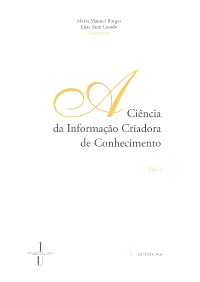Please use this identifier to cite or link to this item:
https://hdl.handle.net/10316.2/31893| DC Field | Value | Language |
|---|---|---|
| dc.contributor.author | Araújo, Eliany Alvarenga de | |
| dc.contributor.author | Bezerra, Marcos Antonio Alexandre | |
| dc.date.accessioned | 2014-06-27T09:59:08Z | |
| dc.date.accessioned | 2020-09-20T12:14:00Z | - |
| dc.date.available | 2014-06-27T09:59:08Z | |
| dc.date.available | 2020-09-20T12:14:00Z | - |
| dc.date.issued | 2009 | - |
| dc.identifier.isbn | 978-989-26-0319-3 (PDF) | |
| dc.identifier.uri | https://hdl.handle.net/10316.2/31893 | - |
| dc.description.abstract | The expressive changes that are taking place in the society (Globalization, Internet, information and knowledge society, etc.) have brought about significant impacts on the epistemological field of Information Science. Those impacts have arrived to the field of ethics and have generated questions about the conceptions of “doing rightly”, “doing well” or “must be”. From these considerations arises an initial question, which orientates our reflections: Which ethics values can be noted in the current epistemological context of Information Science? From this question, we will be able to seek some important indications, in the field of Information Ethics, which enables us to design possible answers. Thus, if ethics is the theory or the explanation of human experience, considering its totality/diversity in terms of moral values and rules, Information Ethics is the field that tries to mediate the different aspects and conflicts arising from the relation between information and human freedom, based on the reciprocity of rights. This collocation shows us the existential dimension of our living together condition and the use of information. With these positions we have sought in Bachelard’s Historical Epistemology the reflexive support needed to develop our text. According to this thinker, knowledge is thought as a “historical production” therefore, the necessity to look for support on an “open and mobile philosophy”, which denies the permanent and definitive method. So, each science has to produce, in every moment of its history, its own rules of truth, and the criteria for its existence. The boundary of the field of this study originated from two historical moments of the Information Science: the origin of this field and its entailing to technological developments. From this methodological clipping we hope to advance in knowledge on the present values, rules and criteria of existence of the Information Science, that way, looking for understanding and enlarge our knowledge about epistemology of this field. | eng |
| dc.description.abstract | As expressivas mudanças que vêm se desenvolvendo na sociedade (globalização, Internet, sociedade da informação e do conhecimento, etc) tem criado impactos significativos no campo epistemologico da Ciência da Informação. Tais impactos acabam chegando ao campo da ética e geram indagações relativas as concepções de “bem agir”, “bem fazer” ou “dever-ser”. A partir destas considerações surge uma indagação inicial que orienta nossas reflexões: Que valores éticos podem ser observados no atual contexto epistemológico da Ciência da Informação? A partir desta indagação poderemos buscar no campo da Ética da Informação algumas importantes indicações que nos possibilitem desenhar possíveis respostas. Assim, se a ética é a teoria ou a explicação da experiencia humana considerando a totalidade/diversidade da mesma em termos de valores e normas morais, a Ética da Informação é o campo que tenta mediar os diferentes aspectos e conflitos oriundos da relação entre a informação e a liberdade humana baseada na reciprocidade de direitos. Esta colocação nos revela a dimensão existencial do nosso estado de convivencia e de uso de informação. Diante destas colocações buscamos na Epistemologia Histórica de Bachelard o apoio reflexivo necessário para desenvolvermos nosso texto. Conforme este pensador o conhecimento é concebido como um “produção histórica”, daí termos a necessidade de nos apoiarmos numa “ filosofia aberta e móvel” que nega o método permanente e definitivo. Assim, cada ciência deve produzir, a cada momento de sua historia, suas próprias normas de verdade e os critérios de sua existencia. A delimitação de campo deste estudo se deu partir de dois momentos históricos da Ciência da Informação: a origem deste campo e a vinculação do mesmo aos desenvolvimentos tecnológicos. A partir deste recorte metodológico esperamos avançar em conhecimento sobre os atuais valores, normas e critérios de existencia da Ciência da Informação, buscando com isto, compreender e ampliar nossa compreensão sobre a epistemologia deste campo. | por |
| dc.language.iso | por | - |
| dc.publisher | Imprensa da Universidade de Coimbra | por |
| dc.relation.ispartof | http://hdl.handle.net/10316.2/2749 | por |
| dc.rights | open access | - |
| dc.title | A Ética no contexto epistemológico da ciência da informação | por |
| dc.type | bookPart | por |
| uc.publication.firstPage | 225 | - |
| uc.publication.lastPage | 234 | - |
| uc.publication.location | Coimbra | por |
| dc.identifier.doi | 10.14195/978-989-26-0319-3_19 | - |
| uc.publication.digCollection | PB | - |
| uc.publication.digCollection | AA | por |
| uc.publication.orderno | 19 | - |
| uc.publication.area | Artes e Humanidades | por |
| uc.publication.bookTitle | A ciência da informação criadora do conhecimento Vol. I | - |
| uc.publication.manifest | https://dl.uc.pt/json/iiif/10316.2/31893/223718/manifest?manifest=/json/iiif/10316.2/31893/223718/manifest | - |
| uc.publication.thumbnail | https://dl.uc.pt/retrieve/11372014 | - |
| uc.publication.parentItemId | 52759 | - |
| uc.itemId | 72886 | - |
| uc.object.level | item | - |
| uc.thumbnail.uri | https://dl.uc.pt/iiif-imgsrv/11371992/dl!3!59!14!85!5914851226412885632620877427332175815 | - |
| item.grantfulltext | open | - |
| item.fulltext | With Fulltext | - |
| Appears in Collections: | A ciência da informação criadora do conhecimento Vol. I | |
Files in This Item:
| File | Description | Size | Format | |
|---|---|---|---|---|
| 19-_a_ci_ncia_da_informa__o_criadora_de_conhecimento_vol_i.pdf | 831.13 kB | Adobe PDF |  |
Items in DSpace are protected by copyright, with all rights reserved, unless otherwise indicated.
